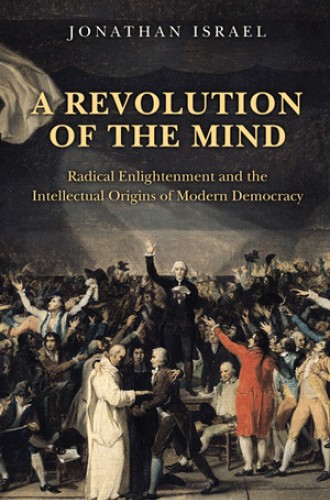A review of A Revolution of the Mind
Perhaps no active scholar has shaped the conversation about the sources and meaning of the Enlightenment more than Jonathan Israel, professor at the Institute for Advanced Study in Princeton. Although his previous two books—Radical Enlightenment and Enlightenment Contested—received wide acclaim, their length and density would prove daunting to nonspecialists. His most recent work is more accessible.
Israel's central claims are as follows:
First, we owe what he views as our most cherished ideals—freedom of speech, freedom of sexual expression, tolerance of religion, representative democracy and the triumph of reason over faith—to the specifically radical Enlightenment.
Second, at the time of the Enlightenment these ideals were hardly agreed upon; they were a matter of dispute not simply between anti- and pro-Enlightenment camps, but also among moderate (or conservative) and radical Enlightenment figures.
Read our latest issue or browse back issues.
Third, the origins of the radical Enlightenment lie in Spinoza, especially Spinoza's monism, which is the only trustworthy route to vouchsafe secular modernity's values.
Fourth, Enlightenment historiography has regrettably devolved into cultural and social history, which downplays the role of ideas in shaping history; in A Revolution of the Mind, Israel combats this turn by illustrating how ideas, not social or cultural factors, constitute the primary agent of revolutionary action.
Israel's demonstration of this sweeping set of claims has gained him the (often begrudging) respect and attention of the academic community.
What does this matter for Christianity? More than almost any other genealogist of modernity, Israel acknowledges no debt or genetic relation between Christian culture and modern democracy. Instead, he posits an unbridgeable gulf between Christianity (or religion or faith or the supernatural) and enlightenment, arguing that the only apparent overlap occurs between the moderate, heterodox Enlightenment and the Christian churches. The implications of this thesis dovetail nicely with the wider program of militant atheism, which determines faith and church to be evil forces fundamentally opposed to modern values. Not merely confused or mistaken, Christianity, in Israel's rendering, is parasitical of human progress.
Almost miraculously, Israel manages to embody the greatest intellectual virtues and vices. The virtues include linguistic facility (he cites texts from at least eight different languages), broad knowledge of sources and a flair for good storytelling. They are accompanied by a litany of intellectual sins, which include shallow reading of texts, blinding failures in logic, theological ignorance, naive etiology, and the irresponsible device of presenting his opponents' arguments at their weakest. Space constraints permit no more than quick mention of some more specific problems: a silence on the Christian tradition of natural law in a discussion of universal values, an embarrassing identification of Johann Gottfried Herder with the radical Enlightenment, and a painfully inadequate comprehension of Kant's philosophical program.
One of the great ironies in Israel's elevation of Spinoza is the mixed legacy of that great apostate. Spinoza's reputation began to recover (or perhaps devolve) in the late 18th century, especially in Germany. Much of this interest resulted from the spat between Friedrich Heinrich Jacobi and Moses Mendelssohn about Lessing's alleged Spinozism. After having long been deemed the "arch-atheist," Spinoza gradually received a warmer reception from many theists and even Christians, including Schleiermacher and Novalis, the latter of whom famously defended Spinoza as "ein Gottbetrunkener Mensch" (a God-intoxicated man). At the heart of German idealism, especially the absolute variety, lay the attempt to combine monism with a kind of Platonism.
One can argue about who Spinoza really was and what his philosophy implied, but the very fact of so much plurality does more to unsettle Israel's claim than he concedes. (Israel himself recalls Spinoza's influence on prominent Socinians and Unitarians.) Spinoza's influence on radical thought was profound, and Israel has done much to highlight that influence. Yet Spinozism also influenced moderate and conservative movements and thus helped shore up their philosophical flank. At least in his early period, for instance, Schelling saw the possibility of "intellectual intuition" as the mental capacity that would allow one to experience God, and this intuition was unthinkable without Spinoza's response to Cartesian dualism. Similarly, Schleiermacher's association of religion with the capacity to see the infinite in the finite may have found its biblical roots in Acts 17, but it relied on Spinoza's monism for its articulation.
These reminders point to a question about influence, particularly the influence of a dead philosopher. The attempt to draw too straight a line between an author and subsequent political events results in a narrowing rather than a broadening of perspective. Did Marx cause the Stalinist purges? Did Herder cause the Balkan violence of the 1990s? Did Leo Strauss start the second Gulf War? Did St. Paul start women's liberation? Did Thomas Jefferson inspire the Tea Party movement? An appreciation of Spinoza's complex legacy does not undermine his influence on modern secularism, but it does remind us how much ideas depend on subsequent readers, whose horizon is always shaped by other ideas and whose appropriation of a given author means that any great author's legacy is undetermined. This is what we mean when we talk about such authors spinning in their graves. Israel's too-tidy connection between ideas and political manifestations confuses this reality.
This overly linear approach also manifests itself in Israel's effort to draw straight lines between metaphysics, politics and religion. Monism does not guarantee democracy or antiauthoritarianism. For as much as Israel wants Spinoza's enlightenment to be truly democratic and not at all elitist, the preface to Spinoza's Tractatus shows a marked hostility to the "man on the street" and a snobbish doubt about the capacity for such a man (never mind Spinoza's opinions of women!) to become enlightened by reading his book.
If Spinoza inspired much of our modern secularism, this was hardly necessary. Indeed, the various brands of politics inspired by Christianity, including radically egalitarian systems, demonstrate how much dynamism and diversity can result from any particular worldview. To argue for an inevitability is to deny the dynamism of human freedom, which is a surprising position for Israel to end up in. Christians might wish that the spreading of the gospel would correspond perfectly with an increase in human progress, but the historical record complicates the equation. The same applies to the great Enlightenment philosophers.
From the perspective of Jürgen Habermas, whose influence on Enlightenment historiography is vast, the nature of modernity and the fruit of Enlightenment is the creation and preservation of media and institutions wherein this kind of debate takes place: learned journals, coffee shops, universities, think tanks. What really matters is the debate. For Israel, enlightenment is most centrally a set of conclusions—"the defining core values of modern secular egalitarianism"—reached through a metaphysical system that challenged what preceded it. Israel touches briefly on this formal understanding in his penultimate chapter and argues that the Enlightenment radicals embodied this "collaboration between all honest searchers after truth," while promoting a "generally tolerant, eclectic spirit."
Does Israel live up to this ideal? If he finds no connection between Christianity and modern secular values, if he finds no seed of the modern revolutionary spirit in the 16th-century Reformers and no genuine egalitarianism in the Pauline letters or in the educational efforts of the Dominicans and the Jesuits, and if he discerns no connection between the development of scientific inquiry and belief in a cosmos created through the Logos, then it is difficult to say that he does.
If the embodiment of these virtues signals a radically enlightened intellectual, then the life's work of such Christian intellectuals as Charles Taylor and N. T. Wright embodies these virtues far more readily than the work of Israel. It is a great irony that the greatest anti-Christian—Nietzsche—had insights into Christianity so profound that Christians have learned from them. It will prove equally vexing if the great Christian intellectuals prove to be the truer proponents of liberal toleration than secularism's loudest voices.






